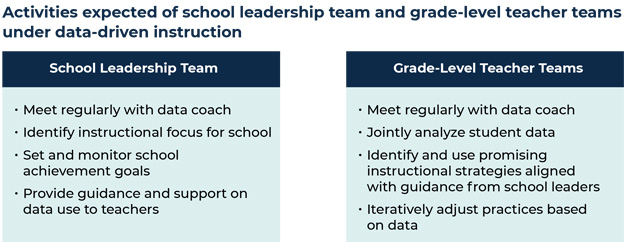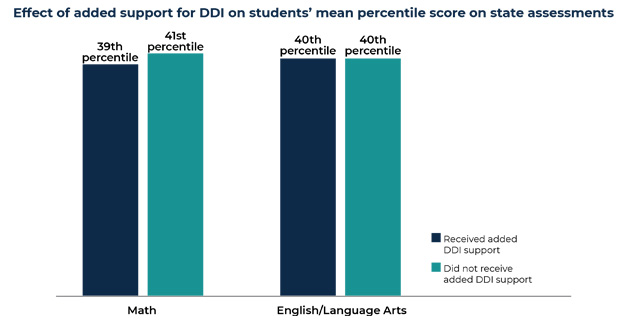Although most school districts help teachers use data to improve student learning, a new Mathematica study shows that providing schools with data coaches and professional development to support their efforts did not result in increased data use by teachers. It also did not change their instructional practices or affect student achievement.
Data-driven instruction (DDI) has been widely viewed as a promising approach to school reform, but until now little has been known about its effectiveness. This study looked at a program of support for school leaders and teachers on how to analyze data to select and put into place strategies for improving their instruction.
Support included providing schools with a half-time data coach for 4th- and 5th-grade teachers, along with professional development and technical assistance for the data coach and school leaders. The idea was to help schools put activities in place to encourage teachers to work together and understand student data. Another goal was to implement evidence-based instructional strategies to improve students’ learning. Schools receiving support for DDI were expected to form a schoolwide instructional leadership team along with teacher collaboration teams in grades 4 and 5.

Key findings from the study include the following:
- Coaching and professional development did not increase teachers’ data use or change their instructional practices. The support offered in this study was intended to boost collaboration among teachers to analyze student data and tailor their instruction in response. However, teachers in schools that received additional DDI support reported using data and data-driven instructional approaches in largely the same ways as teachers in schools not receiving extra support.

- Support for DDI did not improve students’ achievement. Students had similar achievement in math and English/language arts regardless if they were in schools that received extra DDI coaching and professional development. Students in each group scored near the 40th percentile on their state assessments in each subject.
The study suggests some tactics for improving how DDI is supported and implemented in the future. For example, although data coaches in the study were experienced educators and received 40 hours of related professional development, they had rarely worked as data coaches. Inexperienced coaches might need more professional development to be effective. In addition, most programs of support for DDI have emphasized interpreting data more than offering specific guidance on what teachers should do next. Future efforts might do more to emphasize helping teachers identify and select appropriate instructional practices based on their own data analysis.
“More and more organizations and government agencies are leveraging data to make better informed decisions about policies and programs,” notes study director Philip Gleason. “To ensure that our children benefit from data-driven decision-making, our education system must keep pace. Although this study shows that this effort to promote data-driven instruction did not change teaching practices or improve student achievement, the study does point to some possible avenues for improvement in the future.”
Mathematica recruited 102 elementary schools to participate in the study. Half were randomly assigned to receive funding for a data coach of their choosing as well as intensive professional development for coaches and school leaders on helping teachers use student data to inform their instruction. Each school implementing this program of support for DDI received a half-time data coach who focused on implementing DDI in grades 4 and 5. With the school principal, the data coach organized and facilitated a school leadership team that ensured teachers had access to student data from formative assessments and oversaw intervention activities across the school. The data coach also organized and facilitated teacher collaboration teams and professional learning communities.

